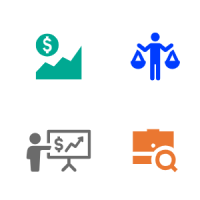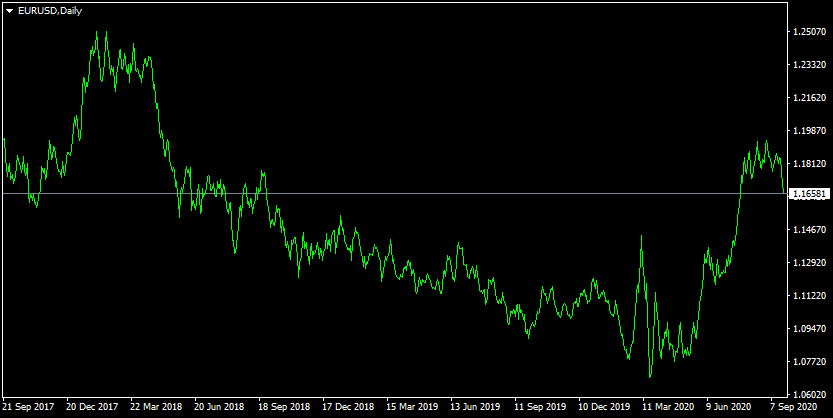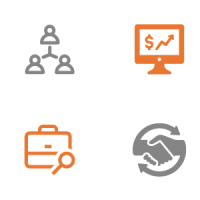Table of content
There are indeed thousands of traders who only trade part time. They usually have their own full time jobs and only devote an hour or some other specific amount of time to trading. However, the reality of the matter is that trading with a full time job can be an appealing prospect for many traders. After all, many people simply do not like to fight on two fronts.
Consequently, there are traders who want to treat trading as a job. This allows them to solely focus on improving their trading skills. The additional benefit from this is the fact that in this case, traders can trade on the place of their choosing. They can even do this from their home if they so choose.
However, here we are dealing with a very logical question: Is this achievable? Can one treat day trading as a job? Well, in order to answer those questions it is worth noting that there are some distinct differences between the standard job and being a full time trader.
One obvious difference here is that when one gets hired for a job, an individual does not have to make a large investment in order to start working. On the other hand, with trading, traders have to fund their account, before they can start earning some money.
Another major difference between those two things is that with trading, the market participants are taking on a significant amount of financial risk. So there is a chance that the market participant might earn no money or even lose some of the funds invested in the trade. On the other hand, there are no such risks with regular employment.
Consequently, the trader might be more compared to the small business owner, rather than an ordinary full time employee. However, this does not mean that one can not trade full time.
In order to achieve this, traders need very solid cash reserves. After all, it might happen that the market participant will not be able to earn enough money to cover all of the living expenses for several months. Consequently, one must have enough reserves to pay for all those expenses.
In addition to that, the trader needs a workspace, where one can work without any major disturbances. The market participants also need a personal computer or a laptop. Obviously, nowadays, it is possible to trade with mobile apps, however, generally speaking, it is much easier to analyze charts with larger screens, compared to doing this type of research on mobile devices.
Finally, it is always helpful to have specially designated working hours, even when working at home. This allows the market participants to get enough rest and sleep, so that they can stay in shape, rather than being exhausted and burned out after some weeks of trading.
Financial Requirements for Becoming a Full Time Trader
For those traders who want to start trading as a full time job, it is important to realize that there are some differences between being a professional trader and having some type of standard job.
The first difference here is that with a regular job, one has to post a CV, attend the interview and if the company decides that the individual is qualified for the position, then one can start working. In nearly all cases, there is no requirement for the individual to invest a certain amount of money in order to be accepted for a job.

Consequently, one does not need to save a certain amount of money in order to get employed. Actually, it is another way around: people get employed so that they have enough money to cover their living expenses and also to save some portion of this type of income for emergencies or some specific goals.
On the other hand, if an individual wants to become a full time trader, one has to have a significant amount of money saved up in order to get started. Here it is worth remembering that traders earn their income by winning trades. However, if the individual has no trading capital to speak of, then he or she simply can not become a full time trader.
So in order to get started, traders need a fully funded trading account. Now, the exact recommended amount to get started does depend on many factors. It depends on the amount of necessary living expenses in the country where traders reside, the amount of leverage used, as well as whether or not they have some additional liabilities to repay.
However, one thing which is obvious is that an individual can not become a full time trader with just $100. Most likely, one has to have at least tens of thousands of dollars in order to pull this off.
Obviously, there is no official regulation which says that one has to have a certain amount of money to become a full time trader. However, the reality of the matter is that an individual simply can not earn enough money from trading to cover all of the living expenses, unless one has a fully funded trading account.
In order to better illustrate this let us take a look at this daily EUR/USD chart:

As we can see from the above image, 3 years ago the most liquid currency pair in the world was trading near 1.19 level. During the subsequent month, the Euro has made some sizable gains, eventually advancing to 1.25 level by February 2018. However, these gains were eventually proven to be short-lived. From late April 2018, the single currency settled for a long term downward trend, which lasted for the next two years.
By March 2020, the pair fell all the way down to 1.07 level. However, this marked an end to the Euro’s decline. In fact, in the course of subsequent months, the single currency has made some notable gains, eventually stabilizing near the 1.1650 level.
So as we can see from this example, generally speaking, the Forex market is not nearly as volatile as the stock market. The biggest move with this pair was the long term decline of the Euro, which fell from 1.25 to 1.07 level in two years. This represents a 14.4% decline of the single currency. So even if the market participants got this trade exactly right, they would have earned approximately a 7.2% return during this period, if they traded without leverage.
Now, the maximum amount of leverage the Forex brokerage companies can offer to their customers for major currencies is 1:50. So in the case of our example, those traders who opened a short EUR/USD position during this period with this amount of leverage would have made a 360% annual return or 30% per month. Consequently, for one to earn $3,000 per month, the trader needs a $10,000 deposit.
Obviously, the trader will not always be so accurate, so it is reasonable to assume that the market participant needs at least twice of the amount in order to cover the living expenses. So here it seems quite safe to assume that one needs at least $20,000 in trading capital to become a full time professional trader.
In addition to that, it is important to point out that in order to become a professional trader, one needs to have a sizable cash reserve as well. The fact of the matter is that there is no guarantee that one will start earning enough money to cover all of the daily expenses from day one.
Even some of the most successful traders who do Forex trading as a job has not started earning massive amounts of money from the first day of the trading. In most cases, they have made some major mistakes, lost significant amounts of money, but over time they learn from those experiences, and become successful. Consequently, it is a much better idea to have at least 1 year’s worth of expenses saved up before ever trying to become a full time trader.
The reason for this is very simple, if a trader does not have enough money for daily expenses then at some point he or she will be forced to abandon trading and start a regular job. As a result, this attempt at becoming a professional trader will fail and thousands of dollars will be lost for no good reason. It goes without saying this is not a wise long term strategy.
Therefore, before ever trying to become a professional trader, one has to have a sizable trading capital, as well as a decent amount of cash reserves for at least a year’s worth of expenses, which might be around $30,000, depending on the location. This means that the market participant can use $2,500 per month for a year for the living expenses.
So traders might be looking for at least $50,000 in total to meet both of those requirements, mentioned above. Obviously, the exact amount recommended will depend on the location and monthly living expenses of the individual.
Experience and Psychological Considerations
When an individual wants to do online trading as a job, having a large pile of cash reserves is always very helpful. However, it is not the only thing which is required to pull this off. Another major consideration here is the fact that with a regular job, usually, one has to take no financial risks to start working. The basic principle here is that as long as a person fulfills all the requirements of the job and does the work, he or she will receive the paycheck on a regular basis.
On the other hand, with trading, there is always a risk that the trader might not earn any money, or even worse, one might end up with net losses by the end of the month. Consequently, if one has a fully funded trading account, this does not automatically guarantee that he or she will earn enough payouts to cover all of the living expenses.
In fact, it might happen that traders can have a bad month and have no earnings during this period. In addition to that, it might also happen that the market participant can lose a significant amount of money in the process.
Here it is worth noting that there is no Forex strategy or indicator which can always guarantee a successful trading experience or consistent payouts 100% of the time. However, by studying Forex strategies, fundamental and technical indicators, the market participants can significantly improve the odds of succeeding in their favor.
On the other hand, if the market participant has no idea about those basics and tries to become a professional trader, it is highly likely that the trader will simply end up with a massive amount of losses.
Therefore, it is important for traders to get educated on Forex strategies and indicators, as well as gather some experience, before starting trading as a full time job.
Practical Considerations
It goes without saying that having a decent amount of trading capital, as well as some knowledge and experience is very helpful for becoming a professional trader. However, here it is worth noting that there are also some very practical considerations which simply can not be ignored.
Firstly, one of the most important things here is to have a proper workplace. Some people might overlook this. However, the reality of the matter is that traders need a quiet place to concentrate on their technical and fundamental analysis. Being constantly distracted by noise or seating at an uncomfortable place is not very helpful in that regard. After all, it is worth remembering that a successful trading career depends on the quality of decisions one makes.

Another major factor for success here is to be well-rested before one starts trading. Trying to open and close positions all the time without getting enough sleep and rest, can easily exhaust even some of the most diligent and energetic individuals. This type of exhaustion then can easily lead to nervous breakdowns and very poor decision making. This can be very damaging not only for one’s finances but also for the heath of the individual as well. This might have such a dramatic effect on the individual that one day he or she might decide to just give up on trading altogether and try something new.
Consequently, if one wants to become a successful professional trader, it is important to get enough rest at all times. One way to achieve this is to set trading hours, outside of which, the individual can sleep and spend some time in other types of activities. This can help traders to be well-rested before starting their trading day.
Finally, another major component for becoming a successful full time trader is to have the proper equipment. It is true that nowadays many Forex brokerage firms allow their clients to trade with mobile apps. This can be very convenient for many people, since they can execute traders from everywhere, regardless of their location.
However, the fact of the matter is that if one wants to become a full time professional trader, an individual has to analyze many charts with different time frames and go through a number of economic indicators of dozens of different countries. Obviously, theoretically, traders can do it on their mobile phones as well.
Yet, practically speaking, the more efficient and convenient way to do it is to use a personal computer or a laptop. With larger screens, keyboard, and mouse at hand, one can do the necessary research at a much faster rate and also do this more accurately.
Therefore, it might be a good idea for those people who want to become a professional Forex trader to invest in a decent laptop or personal computer, in order to make their trading experience much easier and also make their daily analysis much more accurate.
Becoming a Full Time Professional Trader – Key Takeaways
- Despite some of the similarities, it is important to remember that there are a number of important differences between the regular job and full time trading. Firstly, it is essential to recognize that in the first case one does not have to come up with a sizable amount of trading capital in order to start working, while in the second case it is unavoidable. In addition to that, there are no personal financial risks involved with most regular jobs. On the other hand, with trading, there is always some amount of risk for losing money.
- One of the most important components for becoming a professional full time trader is to have a sizable amount of money as a trading capital since otherwise, one can not earn enough money to pay for his or her living expenses. In addition to that those trades have to have some cash reserves set aside, in order to cover their daily expenses, before they can earn enough money to do it themselves.
- Before attempting to become a full time trader, it is very important for the market participants to learn essential Forex trading strategies, as well as fundamental and technical indicators in the market. It is also worth noting that the market participants need to get enough rest on a daily basis, in order to maintain productivity and make their analysis as accurate as possible.



